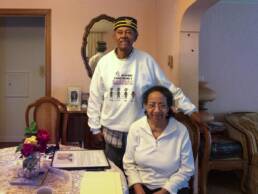I was born in 1931 in Demopolis, Alabama, the oldest of nine children. For our people down south, you know, we weren’t treated fairly. My parents were sharecroppers. I was drafted into the military out of high school and served in the Korean War. Afterward I said I’m going to get my freedom one way or another. It wasn’t right, being treated like that, being an American citizen. I couldn’t live with those Jim Crow conditions.
— Julius Lee

A note from Anne Winkler-Morey: Julius Lee passed away on August 1, 2022. May he rest in peace. Comfort to his wife Effie, and all of his family and friends. Julius loved to brag about his grandchildren. (Check out his sweatshirt in the second photo here.)
Julius and Effie Lee have been my neighbors for 29 years. I interviewed him in June 2016. As we sat down he handed me the spring 2016 bulletin of the Prince Hall Masons to study. The fraternal organization has roots going back to the 18th century. Today, chapters engage in school supply drives and Black History programs. In spring 2016, the Minnesota chapter, which Julius was part of, had just initiated a “Take the Kids Fishing” program and a “Healthy Lives” event that included private HIV/STD screening.
Jim Crow Alabama in the 1930s
I’ll be 85, if I live to July. I was born in 1931 in Demopolis, Alabama, the oldest of nine children. For our people down south, you know, we weren’t treated fairly. My parents and grandparents and great grandparents before them didn’t get much opportunity to get an education. We were denied equal opportunity. They said separate but equal, but it was a whole lot of different baby—white people passed their outdated stuff to us. They had better schools, better educated teachers….
My parents were sharecroppers. As hard as they worked, they didn’t have anything to show for it. They encouraged us to get out of the place, get moving. Most of my siblings went out east. A brother went to Chicago.
Military Service and Second Class Cizenship
I was drafted into the military out of high school and served in the Korean War. I fought for my country and put my life on the line. Afterward I said I’m going to get my freedom one way or another. It wasn’t right being treated like that, being an American citizen. I couldn’t live with those Jim Crow conditions.
Tuskegee and Going North
I went to Tuskegee University. Afterward I was offered jobs in Miami, DC, Detroit and Chicago. I didn’t want Chicago: shoot-me-up, drug-me-up, too much violence, too much poverty, too much suffering, people stacked on top of each other. Not for me. I wanted to go farther north.
They said, “How far north?”
I said, “As far as I could go.”
They said, “How about Minnesota?”
I said, “I’ll take a shot at that.”
They said, “Well you know, not many Blacks live up there.”
I said, “I’m not looking for Blacks, I’m looking for equal opportunity.”
I wanted my children to live in a better environment. I wanted the best education they could get. There was a man who graduated from Tuskegee before me and had set up his own catering company in Minnesota. He was looking for Tuskegee graduates to work for him.
Living in the Minneapolis YMCA
When I came to Minneapolis, I lived in the YMCA downtown. The old building, you know? They had place for single men to live. Kept it nice and clean. Economical. It was like a dormitory, had a nice restaurant and coffee shop. That is where I stayed until I became engaged and married.
I met my wife at Tuskegee. She didn’t know about me then. Coincidentally, she came to Minneapolis to do an internship for the Industrial Catering Company.
Meeting Effie, the Woman of His Dreams
I was working on the top of a roof. My boss stopped to throw me up a lunch. I saw her in the car and I almost jumped off the building. My boss said, “Man, don’t jump off that roof! You might hurt yourself! You’ll get to meet the young lady.”
Julius laughed. In that laugh you could hear the young Julius, seeing the lady of his dreams.

